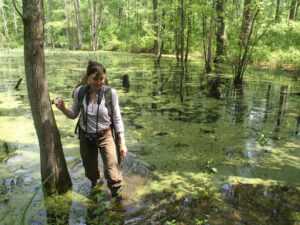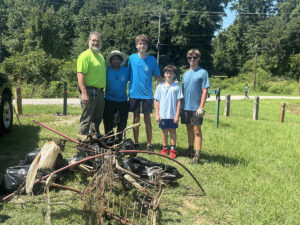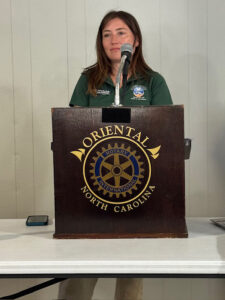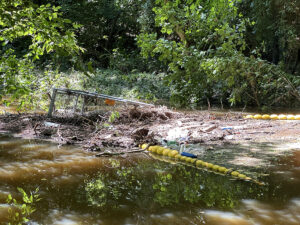News
Sound Rivers working with county on Slocum Creek pollution fix
Environmental, Neuse River Watershed, Sound Rivers, Stormwater Issues, Stormwater Runoff, Water Quality
Posted on June 13th, 2024
In February of 2024, sater samples from Slocum Creek upstream and downstream of Wolf Pit Branch pointed to the small tributary as the source of pollution.
Sound Rivers is working with the Craven County Health Department to resolve the ongoing pollution of Slocum Creek in Havelock.
Neuse Riverkeeper Samantha Krop met with health supervisors and an assistant for the Southeast Rural Community Assistance Project this week to discuss the pollution problem plaguing the creek since last year.
“The goal of our meeting was to address the water-quality and human-health issue of elevated bacteria in Slocum Creek that we identified through our water-sampling program,” Samantha said. “It was a great conversation. The county is very willing and eager to work with us to address the issue.”
Last summer’s weekly Swim Guide sampling and testing pointed to a larger problem in Slocum Creek — even in periods of dry weather when elevated bacteria could not be attributed to stormwater runoff, the creek continually came back with extremely high levels of fecal bacteria. Further investigation by Water-Quality Specialist Taylor Register identified the source as human. The City of Havelock’s infrastructure issues were ruled out as the source after the city conducted smoke and CCTV tests. Sound Rivers’ investigation then evolved to try to figure out where, exactly, the pollution was coming from. Sampling via kayak, Taylor, Samantha and Pamlico-Tar Riverkeeper Katey Zimmerman used process of elimination to figure it out.

The source is Wolf Pit Branch, a small tributary of Slocum Creek that runs through older neighborhoods, and the cause is likely failing septic systems.
Now, Sound Rivers and the county are working together to reach out to the people in that community.
“We explored a lot of different ways we could reach out to community members that might by contributing to the problem and offer information on funding opportunities and low-interest loans to repair or replace septic systems,” Samantha said. “It’s a 50-to-60-person community along Wolf Pit Branch, and we agreed to work together to send them mailers that will include information from us explaining why septic systems can harm water quality, why they should care about it and how they can help us with our sampling, as well as information from the county health department.”
She said the hope is that people will reach out to start addressing the issue.
“Thankfully, we’re actually moving in a direction to fix it now and not just still wondering what the heck the going on,” Samantha said. “It feels better to know what the problem is and be working towards a solution with the county.”
Related News

Public hearing will determine the fate of many NC wetlands
June 26th 2025

Clayton gets first official trash-trap cleanout
June 25th 2025

Bill passed by NC House threatens public health, environment
June 25th 2025

Riverkeeper talks programs with Oriental Rotary Club
June 25th 2025

Riverkeeper, intern scout Smithfield trash trap locations
June 25th 2025

Fish kill reported on the Neuse
June 19th 2025

Riverkeeper meets with ATV park attorney
June 19th 2025

Riverkeeper samples scene of Rocky Mount sewer spills
June 19th 2025

